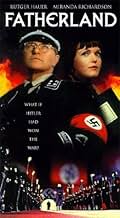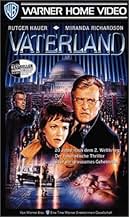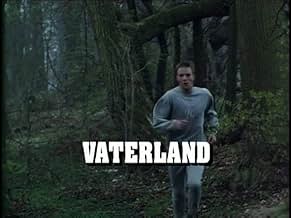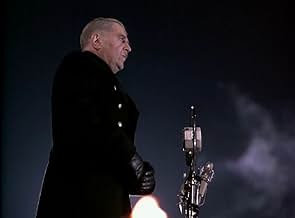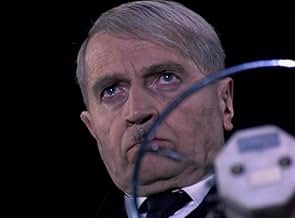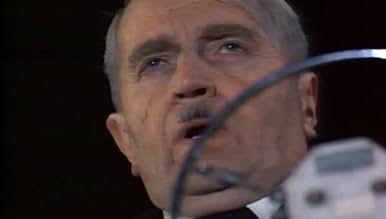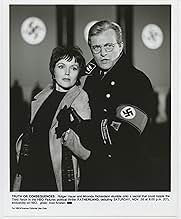Aggiungi una trama nella tua linguaIn April 1964, more than twenty years after the Nazis won World War II, S.S. officer Xavier March uncovers a plot to eliminate the attendees of the Wannsee Conference so that Germany can est... Leggi tuttoIn April 1964, more than twenty years after the Nazis won World War II, S.S. officer Xavier March uncovers a plot to eliminate the attendees of the Wannsee Conference so that Germany can establish better relations with the U.S.In April 1964, more than twenty years after the Nazis won World War II, S.S. officer Xavier March uncovers a plot to eliminate the attendees of the Wannsee Conference so that Germany can establish better relations with the U.S.
- Regia
- Sceneggiatura
- Star
- Candidato a 1 Primetime Emmy
- 3 vittorie e 5 candidature totali
- Guide Helga
- (as Petronella Q. Barker)
- Fake Porter
- (as Charles De'Ath)
Recensioni in evidenza
Without any knowledge of the book, the film is excellent. A tense thriller set in a unique setting with presentation that makes anyone who enjoys historical stuff (like myself) engrossed. The alternative history, the Albert Speer architecture, the carefully thought out references to actual historical events such as the bombing of Dresden and the nuclear attacks on Japan. Both of which are considered war crimes by many, allowing for a small hint of socio-political commentary.
The flaws lie in the plot, which has significantly deviated from the book, in that the ending seems over-dramatic. I will not spoil it but those of you who have read the book will possibly agree that the ending to the novel is more intense, subtle and powerful. Rutger Hauer's performance is excellent, well acted and his style is perfectly fitting of a character like Xavier March. Miranda Richardson plays the role of Charlie Maguire solidly, at times a little wooden and restrained.
All in all, the film is a decent homage to Robert Harris' most famous, and arguably his best, novel. For a low budget, mid 90s TV movie, I am impressed. I would love to see a new adaptation of the book, perhaps with a longer runtime (less condensation) and with a larger budget?
Unfortunately, none of this is present in the movie, which spends far too much time in explaining to the viewers that R. Hauer is a good Nazi, showing him being a good father to his kid, etc... The film lacks also in pace, it lacks credibility (the depiction of the Nazis, the SS, the Gestapo, etc. is nothing less than grotesque, totally unreal), it seems as if the director actually never even read the book... And then the ending to top it all off... What a pity. Maybe someone in the future will attempt a second filming of this novel with better success. Let's hope so...
"Fatherland" is one of Ruger Hauer's better recent movies. It takes a look at what would have happened if Nazi Germany had survived, even if the US had never gone to war with Germany.
The movie shows the grandiose architectural empire that Hitler had planned to make out of Berlin, as it would look on his 75th birthday. The special effects are notable more for their subtlety than dramatics, many of the fictional monuments look perfectly natural. The appearance of Nazi era clothes and uniforms against a sixties era eastern europe looks both plausible and surreal.
The movie itself focuses on a patriotic cop (Hauer) and an american journalist who look into a series of murders that involved the "greatest secret" of the Reich.
"Fatherland" is a better than average drama and at the same a very disturbing look at how history could have turned out differently.
Lo sapevi?
- QuizMike Nichols bought the bestselling novel for one million dollars, intending to produce it as a theatrical movie. When none of the Hollywood studios were interested, the production was reduced to a television movie for HBO.
- BlooperMost measurements are given in metric, used in Germany since 1876, however when Luther is trying to escape at the metro station his height is given in feet and inches and his weight in pounds.
- Citazioni
Narrator: [opening narration] It has been 20 years since the Second World War ended with the failure of the Allied invasion of Normandy. A triumphant Hitler declared victory over Europe and the British Empire. The United States withdrew from the conflict, listening to those like Charles Lindbergh, who had argued against a war with Germany. In the East, only the Russians fought on in a bitter guerrilla war. American efforts turned to retribution for Pearl Harbor. That came in the summer of 1945, with victory over Japan. By then, American general Eisenhower returned from Europe to the United States and a humiliating retirement. In 1947, King Edward and Queen Wallis assumed the British throne. Winston Churchill, who had barely escaped with his life after Normandy, died in exile in Canada in May 1953. In the years after the war, country after country of the old Europe had become part of the vast Nazi empire of Germania. The Fuhrer's architect, Albert Speer, built a monument to the Thousand-Year-Reich. Germania's capital, Berlin, became a Nazi showplace. The SS became a peacetime police force, patrolling clean, orderly streets. As the '50s came to a close, Hitler was able to put a more civilized face on the Greater Reich, but news continued to be tightly controlled. The '60s began with the war with the Soviet Union still dragging on. Hitler desperately needed to conclude a formal peace with the United States and forge an alliance against the Russians, still led by the 85-year-old Joseph Stalin. Hitler saw signs of hope in late 1960 with the election of a new President of the United States. The Fuhrer believed with President Joseph Kennedy Sr. in office, at last there would be someone with whom a deal can be struck. Now in 1964, for the first time in 20 years, Germania's borders are being opened to the Americans. The world press is being invited to cover the Fuhrer's birthday celebration on April 20th. There are rumors that President Kennedy will attend a Germanian-American summit conference. An alliance with America would ensure Germania's invulnerability... but there are more persistent rumors that could threaten Hitler's plans. There are stories that something terrible happened in Germany during the war. That the official Nazi story that Jews and other minorities were relocated to the East, wasn't true. There are also rumors that in the Greater Reich, terrible things are still happening. Television, radio, and newspapers are controlled by the powerful Ministry of Information. Nobody, in a new Berlin, dares to ask awkward questions.
- Curiosità sui creditiSarah Berger is credited as as Leni Kalder but is called "Anna" by Xavi.
- Versioni alternativeAfter the film aired on HBO, a few changes were made for the VHS version. The opening montage of black and white newsreel footage had two or three sentences of narration replaced and the accompanying images changed. In addition, a line was added to the end, an announcer heard over loudspeakers, saying that "President Kennedy is leaving Germany, taking with him the warm wishes of the German people," to make it totally clear to the audience that Kennedy had decided to abandon the alliance with Hitler.
- ConnessioniFeatured in The 52nd Annual Golden Globe Awards (1995)
I più visti
Dettagli
- Tempo di esecuzione1 ora 46 minuti
- Colore
- Mix di suoni
- Proporzioni
- 1.33 : 1
Contribuisci a questa pagina


